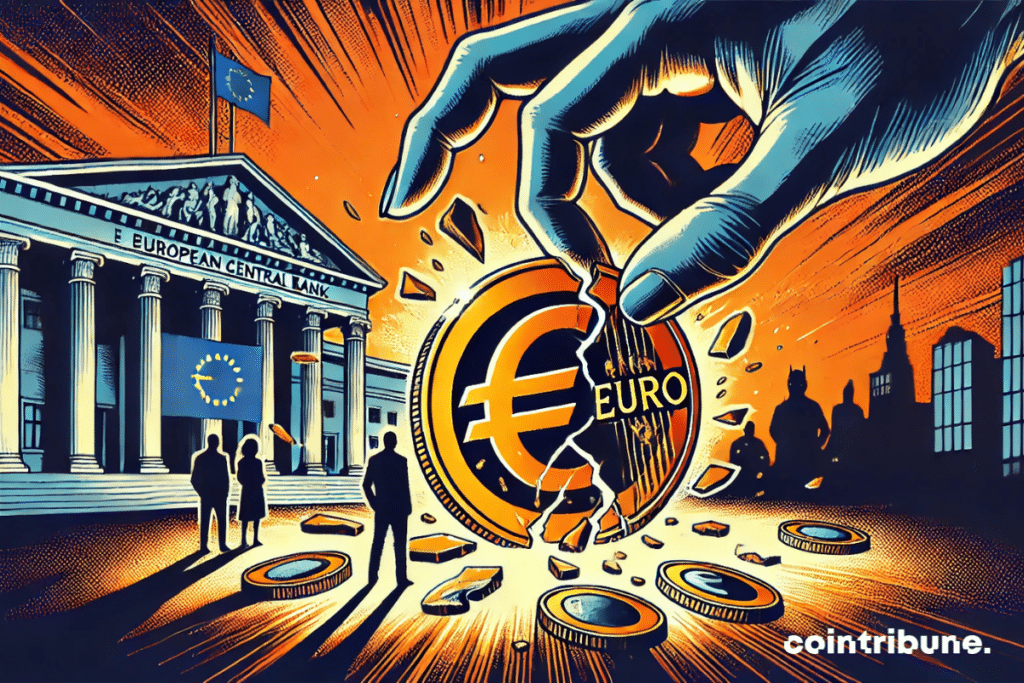ECB Cuts Rates To 3 % Amid Economic Challenges
The European economy is going through a period of instability where geopolitical tensions blend with a marked slowdown in growth. In this uncertain context, the European Central Bank (ECB) is faced with a major challenge: to reconcile the need to contain inflation with the urgency of reviving a weakened economy. To address these issues, the institution led by Christine Lagarde has announced a new reduction in its key interest rate, lowered by 25 basis points to 3 %. This decision, the third of its kind in six months, reflects a gradual and cautious approach. However, this choice has sparked criticism. While some applaud the continuity of this policy, others point to a lack of boldness and even consider that more ambitious measures would be necessary to stimulate consumption and investment.

A measured reduction in key interest rates
The European Central Bank (ECB) announced a reduction in its key interest rate, now set at 3 %. This third consecutive decrease since June 2024 is part of a strategy aimed at supporting a weakened European economy. During the press conference on Thursday, December 12, 2024, Christine Lagarde, President of the ECB, reaffirmed the institution’s priority: “our objective remains to guarantee an inflation close to 2 % in the medium term”.
This new monetary adjustment comes in a context where inflation, although clearly slowing, remains uneven across sectors. While the entire eurozone benefits from a calm on prices, certain areas, such as services, continue to face inflationary pressures due to significant wage increases. Furthermore, the deterioration of the geopolitical situation fuels fears of an additional energy shock, which reinforces economic uncertainties. Thus, to address these challenges, the ECB favors a gradual approach, aiming to maintain a delicate balance between price stabilization and growth preservation. Such caution, although justified by the risk of further weakening the economy, is nevertheless criticized by several economists. They argue that a more aggressive policy would have been necessary to rapidly invigorate investment and employment in a faltering eurozone.
A debate on strategy : towards a more ambitious adjustment?
According to economists such as Christian de Boissieu, Vice-President of the Circle of Economists, the caution displayed by the ECB could incur significant costs for the European economy. He emphasizes the urgent need for more pronounced action: “given the timelines of monetary policy, it’s now, and not in six months, that the ECB must act.” In reality, the beneficial effects of a reduction in interest rates generally take a year or more to materialize fully, which fuels criticism of the gradual approach adopted by the institution.
In this context, the notion of “neutral interest rate” takes on particular importance. This concept, estimated by the ECB between 1.7 % and 2.5 %, designates a threshold of equilibrium at which monetary policy ceases to be restrictive without becoming expansionary. Currently, the ECB maintains a margin of approximately 100 basis points before reaching this level. Some experts argue that lowering rates below this threshold, even temporarily, could accelerate the revival of the economy while keeping inflation under control. Furthermore, Christine Lagarde has tempered these proposals and emphasizes that: “any decision must be based on the latest data and not on hasty anticipations.”
This debate sheds light on the complex challenge the ECB faces: to preserve its credibility as the guardian of monetary stability while responding to growing pressures to further support growth and employment. If the current strategy favors caution, its long-term effects on the European economic situation remain uncertain, which raises expectations for bolder adjustments in 2025.
The ECB’s decisions regarding the reduction of the key interest rate reflect the search for a complex balance between caution and intervention. While the objective of stabilizing inflation around 2 % seems achievable, sustainably reviving the European economy remains a significant challenge. This challenge is all the more crucial in a context marked by geopolitical uncertainties and increased economic fragility. Upcoming choices, expected in 2025, will be decisive for the future of the eurozone. Investors and governments will closely scrutinize the ECB’s ability to adapt its policy to reconcile monetary discipline and support for growth. Each adjustment could shape the economic recovery, but also the confidence placed in the institution.
Maximize your Cointribune experience with our "Read to Earn" program! For every article you read, earn points and access exclusive rewards. Sign up now and start earning benefits.
Diplômé de Sciences Po Toulouse et titulaire d'une certification consultant blockchain délivrée par Alyra, j'ai rejoint l'aventure Cointribune en 2019. Convaincu du potentiel de la blockchain pour transformer de nombreux secteurs de l'économie, j'ai pris l'engagement de sensibiliser et d'informer le grand public sur cet écosystème en constante évolution. Mon objectif est de permettre à chacun de mieux comprendre la blockchain et de saisir les opportunités qu'elle offre. Je m'efforce chaque jour de fournir une analyse objective de l'actualité, de décrypter les tendances du marché, de relayer les dernières innovations technologiques et de mettre en perspective les enjeux économiques et sociétaux de cette révolution en marche.
The views, thoughts, and opinions expressed in this article belong solely to the author, and should not be taken as investment advice. Do your own research before taking any investment decisions.